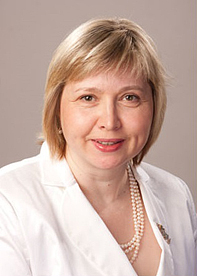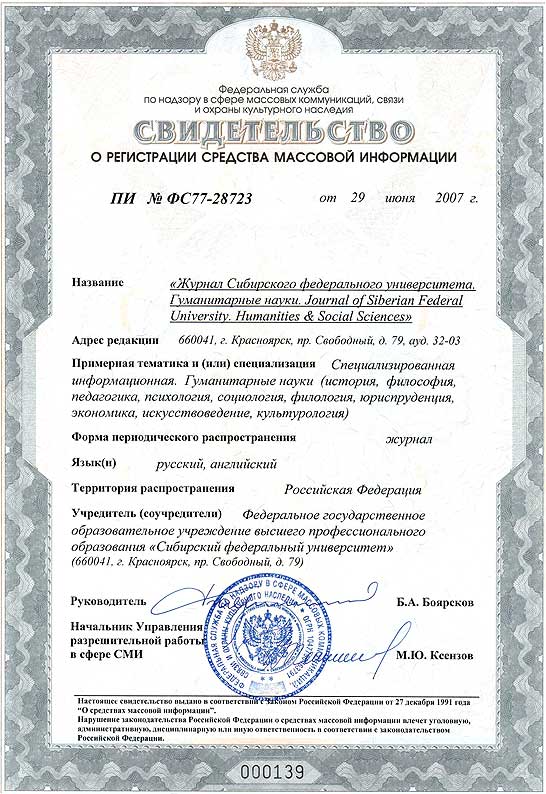The publication in a peer-reviewed journal is a direct reflection of the quality of the work of authors and their institutions. Peer-reviewing of the articles makes it possible to follow the scientific school in the presenting research. Therefore it is important to harmonize the ethical principles for all parties involved in the publishing process: the author, the journal editor, the peer reviewer, the publisher.
- Editor-in-Chief
- Editorial Board
- Aims & Scope
- Open access statement
- The procedure for reviewing and publishing articles
- Information for Authors
- Contact us
- Online First (Prepublication)
- Current Issue
- Published Articles
- Prepublication
- 2026 19 (2)
- 2026 19 (1)
- 2025 18 (12)
- 2025 18 (11)
- 2025 18 (10)
- 2025 18 (9)
- 2025 18 (8)
- 2025 18 (7)
- 2025 18 (6)
- 2025 18 (5)
- 2025 18 (4)
- 2025 18 (3)
- 2025 18 (2)
- 2025 18 (1)
- 2024 17 (12)
- 2024 17 (11)
- 2024 17 (10)
- 2024 17 (9)
- 2024 17 (8)
- 2024 17 (7)
- 2024 17 (6)
- 2024 17 (5)
- 2024 17 (4)
- 2024 17 (3)
- 2024 17 (2)
- 2024 17 (1)
- 2023 16 (12)
- 2023 16 (11)
- 2023 16 (10)
- 2023 16 (9)
- 2023 16 (8)
- 2023 16 (7)
- 2023 16 (6)
- 2023 16 (5)
- 2023 16 (4)
- 2023 16 (3)
- 2023 16 (2)
- 2023 16 (1)
- 2022 15 (12)
- 2022 15 (11)
- 2022 15 (10)
- 2022 15 (9)
- 2022 15 (8)
- 2022 15 (7)
- 2022 15 (6)
- 2022 15 (5)
- 2022 15 (4)
- 2022 15 (3)
- 2022 15 (2)
- 2022 15 (1)
- 2021 14 (12)
- 2021 14 (11)
- 2021 14 (10)
- 2021 14 (9)
- 2021 14 (8)
- 2021 14 (7)
- 2021 14 (6)
- 2021 14 (5)
- 2021 14 (4)
- 2021 14 (3)
- 2021 14 (2)
- 2021 14 (1)
- 2020 13 (12)
- 2020 13 (11)
- 2020 13 (10)
- 2020 13 (9)
- 2020 13 (8)
- 2020 13 (7)
- 2020 13 (6)
- 2020 13 (5)
- 2020 13 (4)
- 2020 13 (3)
- 2020 13 (2)
- 2020 13 (1)
- 2019 12 (12)
- 2019 12 (11)
- 2019 12 (10)
- 2019 12 (9)
- 2019 12 (8)
- 2019 12 (7)
- 2019 12 (6)
- 2019 12 (5)
- 2019 12 (4)
- 2019 12 (3)
- 2019 12 (2)
- 2019 12 (1)
- 2018 11 (12)
- 2018 11 (11)
- 2018 11 (10)
- 2018 11 (9)
- 2018 11 (8)
- 2018 11 (7)
- 2018 11 (6)
- 2018 11 (5)
- 2018 11 (4)
- 2018 11 (3)
- 2018 11 (2)
- 2018 11 (1)
- 2017 10 (12)
- 2017 10 (11)
- 2017 10 (10)
- 2017 10 (9)
- 2017 10 (8)
- 2017 10 (7)
- 2017 10 (6)
- 2017 10 (5)
- 2017 10 (4)
- 2017 10 (3)
- 2017 10 (2)
- 2017 10 (1)
- 2016 9 (12)
- 2016 9 (11)
- 2016 9 (10)
- 2016 9 (9)
- 2016 9 (8)
- 2016 9 (7)
- 2016 9 (6)
- 2016 9 (5)
- 2016 9 (4)
- 2016 9 (3)
- 2016 9 (2)
- 2016 9 (1)
- 2015 8 (Supplement)
- 2015 8 (12)
- 2015 8 (11)
- 2015 8 (10)
- 2015 8 (9)
- 2015 8 (8)
- 2015 8 (7)
- 2015 8 (6)
- 2015 8 (5)
- 2015 8 (4)
- 2015 8 (3)
- 2015 8 (2)
- 2015 8 (1)
- 2014 7 (12)
- 2014 7 (11)
- 2014 7 (10)
- 2014 7 (9)
- 2014 7 (8)
- 2014 7 (7)
- 2014 7 (6)
- 2014 7 (5)
- 2014 7 (4)
- 2014 7 (3)
- 2014 7 (2)
- 2014 7 (1)
- 2013 6 (12)
- 2013 6 (11)
- 2013 6 (10)
- 2013 6 (9)
- 2013 6 (8)
- 2013 6 (7)
- 2013 6 (6)
- 2013 6 (5)
- 2013 6 (4)
- 2013 6 (3)
- 2013 6 (2)
- 2013 6 (1)
- 2012 5 (12)
- 2012 5 (11)
- 2012 5 (10)
- 2012 5 (9)
- 2012 5 (8)
- 2012 5 (7)
- 2012 5 (6)
- 2012 5 (5)
- 2012 5 (4)
- 2012 5 (3)
- 2012 5 (2)
- 2012 5 (1)
- 2011 4 (12)
- 2011 4 (11)
- 2011 4 (10)
- 2011 4 (9)
- 2011 4 (8)
- 2011 4 (7)
- 2011 4 (6)
- 2011 4 (5)
- 2011 4 (4)
- 2011 4 (3)
- 2011 4 (2)
- 2011 4 (1)
- 2010 3 (6)
- 2010 3 (5)
- 2010 3 (4)
- 2010 3 (3)
- 2010 3 (2)
- 2010 3 (1)
- 2009 2 (Supplement)
- 2009 2 (4)
- 2009 2 (3)
- 2009 2 (2)
- 2009 2 (1)
- 2008 1 (4)
- 2008 1 (3)
- 2008 1 (2)
- 2008 1 (1)
The journal is included in the databases: Scopus (Q2), eLIBRARY.RU.
“Journal of Siberian Federal University. Humanities & Social Sciences” is an open access peer-reviewed journal. This Journal does not charge APCs or submission charges.

Dear colleagues!
Professor Michael Gladyshev, the editor-in-chief of the Siberian Federal University Journal, introduced the main goals and areas of work of our journal in the Preface. He also explained the procedure of article submission and requirements for paper reviewing. The editor-in-chief emphasised the fact that each series of the journal is multidisciplinary per se. It essentially concerns the “Humanities and Social Sciences” series, which is oriented towards giving the academic community scientific information concerning a large list of the humanities: anthropology, philosophy, sociology, cultural studies, art history and theory, history, economics, law, psychology, pedagogics, philology, and linguistics. The two important issues for modern worldwide research in the humanities are: 1) applied research and 2) interdisciplinary approach in selecting a subject and methods. The modern humanities are aimed at solving problems in the area of social development, engineering and management. The dream of the last-century humanists that people will rule themselves by means of scientific research of society, objective laws of its functioning and knowledge of the laws of social statics and dynamics is coming true. All over the world humanities and social sciences are working towards this aim today. It is no secret that the humanities in Russia have been facing a conceptual and a methodological crisis from the end of the 20th to the beginning of the 21st centuries. It is particularly relevant to the regional humanities. It is very important for us to identify our position in the world humanities, draw conclusions, and realize what we should do further to make our scientific intellectual work more sought-after and estimated at its true worth in the world scientific community today. At first sight, it seems to be paradoxical that the way to the world humanities starts here, in Siberia, but this is exactly what happens. In the area of humanities, scientific knowledge that helps to improve social life of particular individuals, settlements, cultural and ethnic groups, and religions is most sought after. Therefore articles oriented to applied problems which researchers solve by means of the latest scientific methods are of special importance for us.
Authors of the “Humanities and Social Sciences” series are scientists who have contributed to the development of social management and self-cognition of humankind to improve human life in all its aspects.
The crisis of Russian science makes us conduct strict reviews of submitted articles. We implement the standards of international scientific expertise in our series. Only articles registered on the website of our journal can be considered. Articles sent by e-mail to the editor-in-chief are not considered because, in this case, the story of publication will not be transparent and it cannot be reviewed by experts. Implementation of the electronic system of reviewing and editing will allow us to avoid the complex issues connected with corruption, injustice, and lack of openness which are of great importance for the Russian humanities. We announce that we have to reject many publications because they have not been registered on the website or they do not correspond to the standards of form and content approved in our journal.
We hope that scientists from all the countries of the world will meet on the pages of our journal, while Russian and particularly Siberian researchers will be able to present the results of their scientific work to the world academic community. There is also the fact that almost all articles in our journal are published in English, an international language of academic communication. It is very important to come out to the light and make your scientific research open to the world community. This is the aim and destination.
Although we have referred to the relevance of applied research in the humanities, it does not mean that our journal ignores achievements in fundamental science. On the contrary, new fundamental theories based on purely scientific methods will always be in demand and received with benevolence by our editorial board. The main criterion for the final decision concerning publication is its correspondence to the highest standards of world science. For this reason, we have formed the editorial board which consists of outstanding and promising Russian and foreign scientists who have firsthand knowledge of those standards and implement them in their scientific research on a regular basis. The editorial board is open for all interested scientists whose personal aims and goals coincide with ours.
Dear colleagues, the journal of the “Humanities and Social Science” series was established for you. Together not only will we overcome the crisis of methodological and conceptual bases in the humanities, but we will also raise the status of our science up to the highest world standards.
ISSN 2313-6014 (Online), ISSN 1997-1370 (Print)
 Articles of the Journal are licensed under a Creative Commons Attribution-NonCommercial 4.0 International License (CC BY-NC 4.0).
Articles of the Journal are licensed under a Creative Commons Attribution-NonCommercial 4.0 International License (CC BY-NC 4.0).

 Siberian Federal University
Siberian Federal University 

